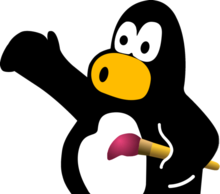Tux Paint: Difference between revisions
(Created) |
(Palette info, and interview link) |
||
| Line 14: | Line 14: | ||
==Configuration== | ==Configuration== | ||
* http://www.tuxpaint.org/docs/en/html/OPTIONS.html | * http://www.tuxpaint.org/docs/en/html/OPTIONS.html | ||
===Palette=== | |||
You can load custom colour palettes. They are a [[Glossary:Main_Page#Plain-Text|plain-text]] file that specifies the colours by sets of numbers representing the RGB channels, or hexadecimal (like in HTML/CSS). You can include more or less that the default palettes 17 colours :) | |||
To load the palette either use the argument <code>--colorfile=[file path]</code>, or use the configuration utility (which you may need to install separately). | |||
====Creating with Gnu IMP==== | |||
You can export palettes from [[Gnu IMP]] either as a .TXT file, which looks like: | |||
<pre> | |||
#000000 | |||
#0000aa | |||
#00aa00 | |||
#00aaaa | |||
#aa0000 | |||
#aa00aa | |||
#aa5500 | |||
#aaaaaa | |||
#555555 | |||
#5555ff | |||
#55ff55 | |||
#55ffff | |||
#ff5555 | |||
#ff55ff | |||
#ffff55 | |||
#ffffff | |||
</pre> | |||
But you'll have to add an empty line at the bottom, otherwise the last colour won't be read. | |||
or as a .GPL, which looks like: | |||
<pre> | |||
GIMP Palette | |||
Name: Linux 16 | |||
Columns: 8 | |||
# | |||
0 0 0 | |||
0 0 170 | |||
0 170 0 | |||
0 170 170 | |||
170 0 0 | |||
170 0 170 | |||
170 85 0 | |||
170 170 170 | |||
85 85 85 | |||
85 85 255 | |||
85 255 85 | |||
85 255 255 | |||
255 85 85 | |||
255 85 255 | |||
255 255 85 | |||
255 255 255 | |||
</pre> | |||
and works if you cut out the stuff up-to-and-including the <code>#</code>, and add a blank line at the end. | |||
==See Also== | ==See Also== | ||
* [http://www.tuxpaint.org/ tuxpaint.org] | * [http://www.tuxpaint.org/ tuxpaint.org] | ||
* [https://www.computerworld.com.au/article/213781/an_open_palette_tux_paint_bill_kendrick/ An open palette: Tux Paint's Bill Kendrick] - Interview | |||
[[Category:Graphics]][[Category:2-D]] | [[Category:Graphics]][[Category:2-D]] | ||
[[Category:Open-Source]] | [[Category:Open-Source]] | ||
[[Category:Android]][[Category:iOS]][[Category:Linux]][[Category:Mac OS]][[Category:Windows]] | [[Category:Android]][[Category:iOS]][[Category:Linux]][[Category:Mac OS]][[Category:Windows]] | ||
Revision as of 11:09, 2 September 2019
| Tux Paint | |
|---|---|
 | |
| Release date: | |
| Made by: | |
| Runs on: | Android iOS Linux Mac OS Windows |
| Imports: | .PNG |
| Exports: | .PNG |
Tux Paint is a child-friendly painting program with a fun interface, similar to Kid Pix.
One of the tool classifications is 'magic' :D
Configuration
Palette
You can load custom colour palettes. They are a plain-text file that specifies the colours by sets of numbers representing the RGB channels, or hexadecimal (like in HTML/CSS). You can include more or less that the default palettes 17 colours :)
To load the palette either use the argument --colorfile=[file path], or use the configuration utility (which you may need to install separately).
Creating with Gnu IMP
You can export palettes from Gnu IMP either as a .TXT file, which looks like:
#000000 #0000aa #00aa00 #00aaaa #aa0000 #aa00aa #aa5500 #aaaaaa #555555 #5555ff #55ff55 #55ffff #ff5555 #ff55ff #ffff55 #ffffff
But you'll have to add an empty line at the bottom, otherwise the last colour won't be read.
or as a .GPL, which looks like:
GIMP Palette Name: Linux 16 Columns: 8 # 0 0 0 0 0 170 0 170 0 0 170 170 170 0 0 170 0 170 170 85 0 170 170 170 85 85 85 85 85 255 85 255 85 85 255 255 255 85 85 255 85 255 255 255 85 255 255 255
and works if you cut out the stuff up-to-and-including the #, and add a blank line at the end.